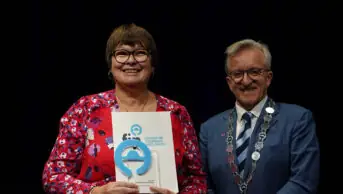
Qonita Anjani / Jennifer Stevenson / The Pharmaceutical Journal
A pharmacist developing microneedle patches, and another who produced a model predicting the risk of medicines-related harm in older patients, have been announced as joint winners of the 2025 ‘Outstanding Pharmacy Early-Career Researcher Award’ (OPERA).
The winners — Qonita Anjani, a research fellow at Queen’s University Belfast, and Jennifer Stevenson, lead pharmacist for older adults at Guy’s and St. Thomas’ NHS Foundation Trust in London — were selected by judges from a shortlist of five candidates.
Now in its third year, the award is jointly granted by The Pharmaceutical Journal and Royal Pharmaceutical Society (RPS) and recognises early-career researchers in pharmacy and pharmaceutical sciences who demonstrate potential to achieve world-leading status.
Anjani was recognised for her outstanding research into innovative drug delivery systems, while Stevenson was chosen for her impactful research identifying the risk-factors surrounding medication-related harm in older adults.
Anjani’s research has focused on developing microneedle patches and long-acting implant technologies in disease areas such as tuberculosis, HIV, diabetes, skin regeneration and schizophrenia. Her research harnesses microneedle technology to deliver high-dose compounds such as antibiotics, antiparasitic and antivirals and she collaborates with leading pharmaceutical companies to scale-up and translate microneedle technology to clinical settings, leading to real-world impact of her research on patients.
Anjani has also designed her microneedle systems to use biodegradable materials, thus reducing waste and the impact on the environment.
Stevenson’s research has revealed the crucial role played by the environment, including social context and psychological factors, in medicines-related harm among older patients.
The risk prediction model she developed, the ‘PRIME’ model, allows healthcare teams to start quantifying the impact of medicines-related harm and adopt approaches that can prevent it from occurring. Jennifer’s work is raising awareness of the risks that medications — even when used appropriately — pose to older adults living with frailty and has contributed to shaping NHS England’s Frailty Programme.
Commenting on her award, Qonita Anjani said: “I am delighted to have been recognised by the RPS for the contribution my research is making to the advancement of long-acting and minimally invasive drug delivery systems that improve treatment adherence and patient outcomes.
“This award reflects the collective efforts of the inspiring mentors, collaborators, and students I have had the privilege to work with, both in the UK and internationally.”
Stevenson said: “I am truly honoured to receive the OPERA. This recognition is a reflection of the incredible mentorship and collaboration that have supported my journey in clinical academic pharmacy.
“My research is driven by a commitment to improving medicines use and health outcomes for older adults, an area of growing importance as our population ages. I’m proud to be part of the expanding clinical academic pharmacy community, where research and patient care go hand in hand to make a meaningful difference.”
Diane Ashiru-Oredope, deputy chief scientist at the RPS and part of this year’s judging panel, said: “The OPERA continues to go from strength to strength. We were thrilled by the number of entries received and the breadth and quality of research conducted by the early-career researchers nominated, spanning pharmaceutical sciences, clinical pharmacy, and practice-based innovation.
“Following a rigorous two-stage judging process, we are proud to announce two joint winners, recognised for their outstanding contributions to pharmaceutical sciences and clinical research. My heartfelt congratulations to both winners — I look forward to following your journeys in the years ahead.”


